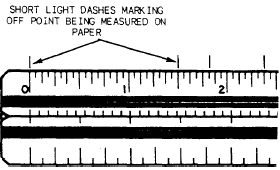|
USE OF THE DRAFTING SCALEAccuracy in drawing depends
to a great extent upon correct use
of the scale in marking off
distances. You should place the edge of the scale
parallel to the line being measured (fig. 3-13). To
eliminate shadows cast by your body or hands, point
the desired scale face away from you for horizontal
measurements and toward your left for vertical
measurements. With a sharp pencil, mark
off short dashes at right angles to the scale
at the correct distances, aligning the mark carefully
with the scale graduation. Have your eye
approximately over the point being measured,

Figure 3-13.-Use of the drafting scale.
and make light marks to denote the
point of measurement.
When setting the compass to a given radius or
when setting divider points, never place the sharp
points of these instruments on the scale. Lay out
the desired radius or distance on a straight pencil
line by using the scale in the manner described
above. Then adjust the compass or dividers
to the indicated length by using the
measured line. A scale surface marred by pinpricks
is difficult to read and is unsuitable for accurate
work.
In making successive measurements along the
same line, make as many measurements as possible
without moving the scale. If a number of
distances are to be laid out end to end, hold the
scale in one position and add each successive measurement
to the preceding one. If the scale is
moved to a new position each time, slight errors
in measurement may accumulate. For example,
four successive measurements of 1 5/8 in.
each should give an overall length of 6 1/2 in., not
6 9/16 in. Therefore, make as many measurements
as you can without changing the reference
point. This will avoid cumulative errors in
the use of the scale.
Note that your pencil touches the scale only for
the purpose of marking a point on the paper. Never
use a scale as a straightedge for drawing lines.
A typical office ruler has a metal edge; it
is a scale and straightedge combined. But a draftsmans
measuring scale is for measuring only;
it is not a ruler. A scale properly used
will last for decades, but a scale used as a straightedge
will soon have the graduations worn away.
|
|

